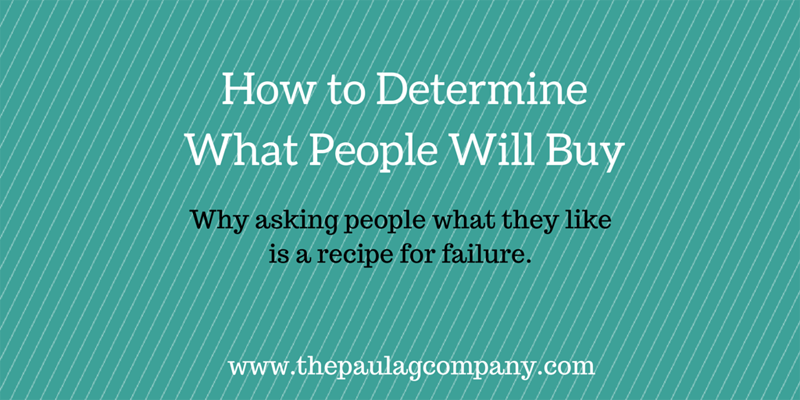Recently I had a prospect come to me with the problem of not knowing what she should sell. Like most well-meaning business owners she thought she would go ask people what they like. Then when she found out what people liked, she would go create and sell that.
It all sounds so logical, right?
Except this is a recipe for disappointment.
Why is that?
Let’s break it down.
Step 1: Talk to ideal customers
This is actually a great step. Nothing gives you valuable market data like speaking to your ideal peeps.
Step 2: Ask them which offerings of yours they like
Well, the asking step is useful, but the question is all wrong. This is where her plan of action breaks down.
Who really cares what your ideal clients might like? Sure, it’s very useful from a getting to know and understand them as a person standpoint, but when it comes to determining your product mix, it is misguided.
[clickToTweet tweet=”Just because someone likes your idea does not mean they will buy it. ” quote=”Just because someone likes your idea does not mean they will buy it.”]
Repeat that sentence to yourself a few times (and if you’re new in business, tape it on a post-it note on your wall near your computer).
You do not want to ask people what they like …
Ask them what they would buy.
Yet even that refinement is not sufficient. It gives you some inkling of where to start, but you need to go a step further to save yourself countless hours of work and gobs of money.
Give them the opportunity to actually buy it.
Build a prototype, run a Beta-test, start selling a class or book you haven’t developed yet.
Give them the opportunity to let their voices be heard through their wallet.
This is the holy grail of business intelligence.
One of two things will happen.
- People will buy. (Yay!)
- People will not buy. (Boo…but yay – you now have business intelligence on this.)
Nothing says “green light this offering” like you ideal client parting with their hard-earned cash.
That said, if they don’t buy, it doesn’t necessarily mean the “thing” you are selling is not needed or of value or should be thrown out for eternity. It could be that your website broke down in the buying process, you made it too hard for them to say yes, or your copy was poor. Maybe the date (for a live offering) conflicted with all the local school’s graduations.
But now, you have valuable business intelligence and haven’t wasted tons of money, energy, or time building what you think they might want.
Now you can make an informed decision based on the data.
- Do you want to change or test one of these other variables and see if your results differ?
- Do you want to scrap this idea and test another?
- Do you want to tweak this idea and try again?
This far beats the alternative of making 100 pieces of jewelry or self-publishing 1000 copies of your book only to have it sit in the attic. It is surely preferable to spending months developing a curriculum for a course that you will only teach to your cat (they like to listen!).
So the next time you wonder, what should I sell? Don’t ask people what they might like. Find out what they will buy.
Need help determining what to test and how to do it efficiently, inexpensively, and so it yields the most results for you (even if it never gets off the ground)? Contact me for a discovery session and learn how I can help you do that.

